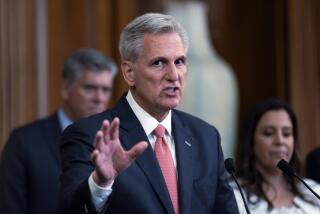U.S. may be able to pay bills beyond debt-ceiling deadline
Obama administration officials have been adamant for weeks that Tuesday is the date the Treasury Department no longer will be able to pay the nation’s bills if the debt ceiling isn’t raised. But the government might be able to buy some more time.
Some analysts now project the Treasury won’t run out of money until Aug. 8 at the earliest and as late as Aug. 15, reducing the necessity for the White House and Congress to strike a deal in the next few days.
The stalemate continued Thursday as House Republicans and Senate Democrats pushed competing plans to raise the debt ceiling and cut spending, with a compromise nowhere in sight.
“They can go a little bit beyond Tuesday, but once we’re into the second half of August … then we’re in serious trouble,” said Nancy Vanden Houten, senior analyst at Stone & McCarthy Research Associates in Princeton, N.J.
She projected the government would be able to survive until Aug. 15, when $41 billion in payments are due, including $29 billion in interest on government securities. At that point, the Treasury would come up short, Vanden Houten said.
But the exact date on which the nation’s bills will exceed its cash balance remains a moving target, analysts said. It depends on the unpredictable flow of tax revenues into the government’s coffers and financial juggling by Treasury officials.
Barclays Capital, for example, said the ability to meet payments would last until Aug. 10 because of $14 billion more than expected in tax revenues collected in recent weeks.
But even if the government continued to pay its bills for several days after Tuesday’s deadline, the precarious financial situation still could rattle the fragile economy. In addition, the nation’s AAA credit rating could be downgraded because of the looming threat of default, causing interest rates to rise and triggering chaos in financial markets.
Obama administration officials still haven’t budged from their view that the nation would hit fiscal Armageddon on Tuesday if the $14.3-trillion debt ceiling is not raised. On that day, the Treasury no longer would have the authority to borrow money.
“From midnight Aug. 2 forward, you are running on fumes,” White House Press Secretary Jay Carney said.
Treasury officials are working on plans for government operations after that point if the debt ceiling impasse continues, a spokeswoman said Thursday.
But some Republicans believe the government could buy even more time by prioritizing whom it pays. They want the government to use its dwindling cash to make interest payments to holders of Treasury securities — preventing a default on those obligations — as well as to send out benefit checks to Social Security recipients and paychecks to active duty members of the military.
“The fact is, there are far more than enough resources for the administration to make these payments,” said Sen. Pat Toomey (R-Pa.), who has been pushing legislation requiring such prioritization.
Treasury Secretary Timothy F. Geithner has said the government doesn’t have the ability to choose which bills it pays. Still, many on Wall Street believe that will be the strategy.
“The chance of a default next week is zero,” said Terry Belton, global head of fixed income strategy at JPMorgan Chase. “There is no possibility even if the Aug. 2 deadline passes that we will miss an interest payment.”
But even though the government could still pay its bills after Tuesday, the money eventually would run out, analysts said. As of Wednesday, the Treasury had about $74 billion in cash on hand, down from about $104 billion a week earlier.
The Treasury has $32 billion in bills due Wednesday, including $23 billion in Social Security payments, according to an analysis by the Bipartisan Policy Center, a Washington think tank.
“Our estimates suggest they will have enough money to pay all the bills due” on Wednesday, said Jay Powell, a visiting scholar at the center and a former Treasury official. “Our guess is that the date when we’re unable to pay all of our bills could be as late as Aug. 8 or 9.”
He said the Treasury can juggle payments for only a short time without the ability to borrow more money. Payments for interest on U.S. debt, national defense and safety net programs such as Social Security and Medicare account for about 85% of federal expenditures. Failure to pay bills in any of those areas would have an immediate negative effect throughout the country.
“The more you look at this, the more you realize you just can’t do it for more than a couple of days,” he said. “The country would feel it right away.”







